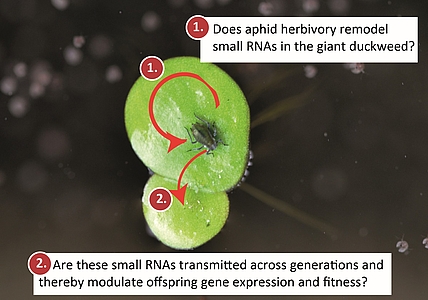Huber/Ketting
The role of small RNAs in transgenerational plasticity of a clonal plant
Supervisor: Meret Huber
Co-Supervisor: René Ketting
Scientific Background
Organisms may modulate their phenotype across generations in the absence of genetic change. Yet, the underlying molecular mechanisms of such transgenerational plasticity are little understood. In animals, transgenerational plasticity can be realized through small RNAs. In plants, small RNAs are hypothesized to mediate transgenerational plasticity during vegetative reproduction, because small RNAs may be transported in the phloem from the mother to the offspring. However, this hypothesis and its evolutionary consequences still need to be tested.
During the last five years, we developed the giant duckweed – a flowering plants that reproduces vegetatively every two to three days – as a new, exceptionally suitable model system to study transgenerational plasticity. We found that aphid herbivory can increase plant fitness in the presence of recurring stress when up to 10 generations separate initial and recurring conditions. As genetic variation is absent in these monoclonal strains and as de-novo mutations are very rare in the giant duckweed, such transgenerational plasticity is likely due to epigenetic mechanisms, for instance small RNAs.
Project description
In this project, we will assess the role of small RNAs in transgenerational plasticity of the giant duckweed (Spirodela polyrhiza) under attack of one of its major native herbivores, the waterlily aphid (Rhopalosiphum nymphaea). We will address the following two key questions: i) Does aphid herbivory remodel small RNAs in the duckweed? ii) Are changes in small RNAs associated with gene expression and defenses?, and iii) Are these small RNAs transmitted across generations and thereby modulate offspring gene expression and fitness?
To assess whether small RNAs can lead to variation in gene expression within and across generations, we will combine small RNA and transcriptome sequencing in duckweeds under transgenerationally recurring aphid herbivory. First, we will profile the small RNAs, gene expression, plant defenses and fitness with and without aphid herbivory within a single duckweed generation. Second, we will assess whether small RNAs are transmitted across generations by sequencing the small RNAs across multiple vegetative generations, and associate small RNAs to gene expression, defense and fitness. To establish causation, we will knock-out either the microRNA template or parts of the small interfering RNA machinery; we will then assess whether these knock-outs have altered gene expression upon recurring herbivory. Together, these experiments will provide novel insights into whether plants can acquire stress resistance across generations in the absence of genetic change through epigenetic inheritance, particularly through small RNAs.
What you will learn
- Analysis of small RNAs and gene expression using high throughput sequencing
- Genetic manipulation using CRISPR-Cas
- Chemical analytics (HPLC-MS)
- Bioassays with plants and herbivores
- Experimental evolution
- Multivariate statistics
Your qualifications
This PhD project is highly interdisciplinary as it spans molecular biology (genetic manipulation through CRISPR), experimental evolution and high-throughput sequencing. We are thus looking for an enthusiastic PhD student with a solid background in one of these methodologies and eagerness to embrace the other approaches. Previous experience in plant research is advantageous but not required.
Publications relevant to this project
Huber M, Gablenz S, Höfer M (2021) Transgenerational non-genetic inheritance has fitness costs and benefits under recurring stress in the clonal duckweed Spirodela polyrhiza. Proceedings of the Royal Society of London B: Biological Sciences. 288: 20211269. doi.org/10.1098/rspb.2021.1269
Ketting RF, Cochella L (2021) Concepts and functions of small RNA pathways in C. elegans. Curr Top Dev Biol. 144:45-89. doi.org/10.1016/bs.ctdb.2020.08.002
Maizel A, Markmann K, Timmermans M, Wachter A (2020) To move or not to move: roles and specificity of plant RNA mobility. Current Opinion in Plant Biology 57:52-60. doi.org/10.1016/j.pbi.2020.05.005
Xu S, Stapley J, Gablenz S, Boyer J, Appenroth KJ, Sree KS, Gershenzon J, Widmer A, Huber M (2020) Low genetic variation is associated with low mutation rate in the giant duckweed. Nat Commun. 20;10(1):1243. doi.org/10.1038/s41467-019-09235-5
